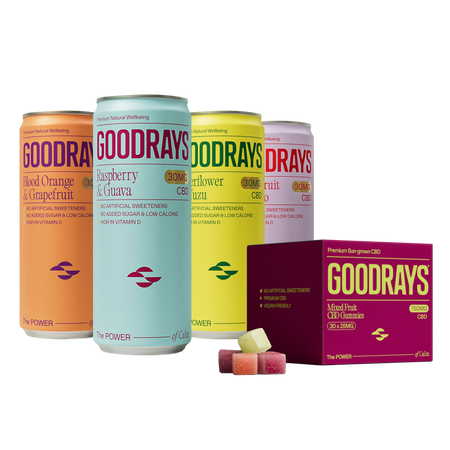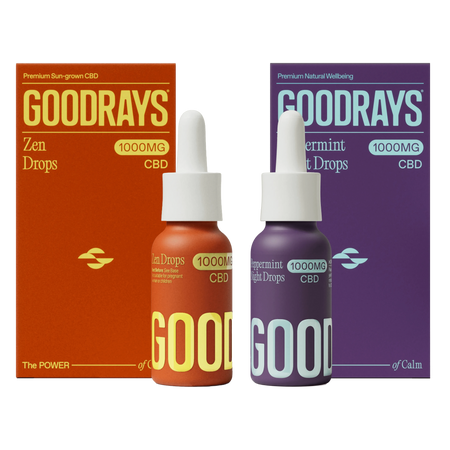Key Takeaways:
- Seasonal affective disorder (SAD) is a type of seasonal depression that affects people in the autumn and winter months
- SAD symptoms include depression, irritability and changes to the way you eat and sleep
- CBD is a compound extracted from the cannabis plant and is different to cannabis - it’s non-psychoactive and won’t get you ‘high’
- CBD works on the endocannabinoid system (ECS) and may help with some of the symptoms of seasonal affective disorder
- CBD can be taken every day in the form of oils, gummies and drinks and is non-addictive
Seasonal affective disorder is a type of seasonal depression. There are various ways to manage SAD, and CBD can help.
What is Seasonal Affective Disorder?
Seasonal affective disorder, or SAD, is a type of depression that occurs at certain times of the year, usually during the darker months.
It affects mental health, causing a low mood, a loss of pleasure in the things we normally enjoy and changes to the way we eat and sleep.
SAD follows a cyclical pattern with the seasons and is often referred to as winter depression or the winter blues.
The causes of SAD
The causes of SAD are not fully understood, however, doctors think that a lack of sunlight during the autumn and winter months is a major contributor.
It’s thought that this lack of sunlight affects the hypothalamus, the part of the brain responsible for the production of the hormones serotonin and melatonin, and the regulation of the body’s internal clock, or circadian rhythm.
Low sunlight levels can cause the hypothalamus to stop working as well. This can lead to low serotonin levels, higher than normal melatonin levels and a disruption to the body clock, which in turn can cause SAD symptoms.
The symptoms of seasonal affective disorder include:
-
Depression, a persistent low mood or feelings of sadness
-
Feeling irritable
-
Sleeping more than usual and finding it difficult to wake in the morning
-
Feeling tired and lethargic during the day
-
Craving sugars, carbohydrates and ‘comfort food’
-
Weight gain
-
Loss of interest or pleasure in things you normally enjoy
-
Loss of libido
-
Brain fog and difficulty concentrating
If you have SAD, you may experience some or all of these symptoms, all or some of the time. Additionally, if you have anxiety, you may notice an increase in your anxiety symptoms if you also experience SAD.
Some people experience the symptoms of SAD during the spring and summer. But on the whole, most people will experience SAD symptoms in the autumn and winter months when natural daylight is at a minimum and going outside often means facing cold, wet, windy weather and darkness.
Can CBD help with SAD symptoms?
CBD can help alleviate some of the symptoms of SAD by interacting with the endocannabinoid system (ECS).
CBD, or cannabidiol, is one of more than 120 cannabinoids found in the hemp plant. Unlike cannabis, CBD doesn’t cause any psychoactive effects or a ‘high’ and isn’t addictive, because it contains no traceable levels of tetrahydrocannabinol (THC).
The endocannabinoid system is a network of receptors running throughout the body, to and from the brain, that help to maintain homeostasis - the delicate internal balance of physiological functions and systems such as appetite, body temperature and the sleep-wake cycle.
It’s thought that CBD is capable of interacting with the receptors of the ECS, helping it to better regulate everything from mood and memory to how you manage pain, disease, inflammation and the stress response.
Regulating your mood
SAD causes the hypothalamus to stop producing enough serotonin. Serotonin plays an important role in regulating appetite, sleep and crucially, mood.
Low serotonin levels can lead to feelings of depression and other SAD symptoms, such as an increase in appetite and the need for more sleep.
CBD can help to reduce feelings of depression, hopelessness, guilt and irritability by interacting with the ECS, causing it to boost levels of serotonin, improving the mood, reducing mood swings and promoting feelings of calm.
Alleviating anxiety
Similarly, an increase in serotonin also helps to alleviate anxiety that can be made worse by SAD symptoms such as feeling tired and difficulty concentrating.
Pain management
If you have SAD and you’re feeling low, tired and lacking in energy, and you also have a pain condition, you may experience pain to a higher degree than usual. CBD may have a positive effect on pain perception by enhancing the ECS, and research into this continues.
Improving your sleep
Melatonin has a role in regulating sleep; levels increase in the evening, making us feel sleepy and ready for bed. But if you have SAD, the hypothalamus may produce more melatonin than necessary, leading to lethargy and tiredness during the day.
Research suggests that CBD may have a positive effect on the ECS which could help to regulate the sleep-wake cycle during the autumn and winter months that would normally be triggered by natural daylight during the lighter months.
Alternative treatments for SAD
Treatments for seasonal depression vary, and many involve lifestyle changes such as increasing our exercise levels, taking steps to manage stress, such as practising yoga and mindfulness and avoiding caffeine and alcohol late in the day to try to avoid disrupted sleep.
SAD symptoms can also be improved by spending time outside in natural sunlight to help provide the hypothalamus with the daylight it needs to function normally. This might mean taking a walk at lunchtime, getting off the bus or train a stop or two earlier during your commute or taking your exercise routine outside each morning.
Exposure to sunlight also increases levels of vitamin D that we may lack during the autumn and winter months, a deficiency of which is also linked to seasonal depression. Taking a vitamin D supplement is also recommended in the UK during the darker months.
Some people find that light therapy helps. Try installing a light box with a white UV light or dawn alarm in your bedroom to emulate an early summer sunrise to expose your brain to simulated sunlight.
Seeking medical advice
If your SAD symptoms, or poor mental health in general, are significantly impacting your day-to-day life, speak to your GP, especially if you’ve tried these alternative treatments for SAD.
They may discuss your suitability for medications such as antidepressants based on your symptoms, medical history and current health and wellbeing.
CBD vs traditional SAD treatments
Many of the alternative and traditional SAD treatments can help to alleviate SAD symptoms or help you manage them better.
Taking CBD each day is simple, just like taking a vitamin or food supplement. High-quality CBD products with no added fillers or unnecessary ingredients are available as drops, drinks and gummies, designed to be taken easily, on the go or as part of a relaxing bedtime routine.
CBD can also be used alongside alternative treatments for SAD, such as daylight exposure, light therapy and vitamin D supplements.
Best CBD formats for Seasonal Affective Disorder
The best form of CBD for you will depend on your personal preferences and lifestyle.
For example, you might like to take a CBD gummy in the morning or drink a CBD-infused drink on your way to work.
Alternatively, you could take CBD oil drops before bed to help promote restful, restorative sleep. Aim to take CBD with added vitamin D to help manage your SAD symptoms.
How much CBD do people typically use?
People often take around 50 mg of CBD per day to support their mood or sleep during the winter months.
However, since there’s no established dosage for Seasonal Affective Disorder (SAD), it’s best to start low at 25 mg daily and monitor how you feel, adjusting gradually to find what works best for you.
Potential side effects and safety considerations
CBD, or cannabidiol, is deemed a “safe, non-toxic and well-tolerated” substance by the World Health Organisation (WHO).
It’s also non-addictive and doesn’t contain the psychoactive compound, THC, at a detectable level. Therefore, there are no known side effects or safety considerations to using CBD if you stick to the brand's suggested dose and guidelines.
Legal and regulatory status of CBD in the UK
In the UK, CBD products, including oils, gummies and drinks, are legal to buy and sell. This means that purchasing CBD won’t get you into any trouble with the law.
CBD is different to medical cannabis, sometimes used to manage medical conditions such as epilepsy and to alleviate the side effects of some cancer treatments, and doesn’t require a prescription.
Research
-
The NHS provides a great overview of SAD, the symptoms and how to manage it, and is a good resource if you’re unsure if you’re experiencing seasonal affective disorder or some other type of depression. Mental health charity Mind also has information on the condition that helps to explain SAD further.
-
This Healthline article also looks at the research discovering positive links supporting CBD for seasonal affective disorder and symptoms of depression in general. This article, also published by Healthline, looks at the facts surrounding low serotonin levels.
-
A 2020 review concluded that CBD can reduce the symptoms of depression and anxiety by interacting with the cannabinoid receptors of the ECS and had "promising results” to support larger-scale studies to “further evaluate CBD as a potential new drug” for depression and anxiety.
FAQs
Can CBD replace antidepressants for SAD?
While CBD products can help to relieve SAD symptoms in some people, it’s never a good idea to give up medication prescribed by your doctor, such as antidepressants, without speaking to your doctor first.
How long does CBD take to work for seasonal affective disorder?
CBD may work differently for different people. In general, CBD oil tends to work more quickly as it’s used under the tongue, where it enters the bloodstream directly. CBD gummies and drinks may be slightly slower to work as they pass through the digestive system into the bloodstream. However, gummies and drinks may be more convenient to use.
Can you take CBD every day during winter?
Yes, you can take CBD to help with seasonal depression every day. Start on a low dose and monitor your symptoms and how you feel, and adjust your dose accordingly.
Does CBD help with winter sleep problems linked to SAD?
CBD can help to promote more restful sleep and a better sleep-wake cycle due to its effect on the ECS.
Are there any risks using CBD if you’re on medication for SAD?
There may be some interactions between some medications prescribed for SAD, so speak to your doctor if you’re thinking of combining the two.
More information
https://www.nimh.nih.gov/health/publications/seasonal-affective-disorder
https://pmc.ncbi.nlm.nih.gov/articles/PMC7699613/
References:
Roth, E. (2022, March 4). Seasonal Affective Disorder (Major Depressive Disorder with Seasonal Pattern). Healthline. https://www.healthline.com/health/seasonal-affective-disorder
Does CBD work for depression and anxiety? (n.d.). WebMD. https://www.webmd.com/cannabinoids/cbd-depression-anxiety
Holland, K. (2025, April 23). Can CBD Help with Depression? Healthline. https://www.healthline.com/health/cbd-for-depression
This article is for informational purposes only and does not constitute medical advice. Please consult your healthcare provider before starting any new supplement, especially if you are pregnant, breastfeeding or taking other medications.
Read more about our author here





